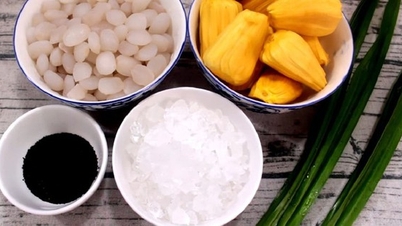1. The importance of diet for people with irritable bowel syndrome
Irritable bowel syndrome is one of the common digestive problems that tends to increase. Although not dangerous, the symptoms of irritable bowel syndrome make the patient always uncomfortable, tired, greatly affecting the quality of life.
Although the cause of irritable bowel syndrome is still unclear, in addition to some factors that are considered favorable conditions for the onset of irritable bowel syndrome such as: tension, stress, intestinal infections, prolonged use of antibiotics, changes in weather, menstrual cycle... there is a close relationship between diet and irritable bowel syndrome.
According to Master, Doctor Nguyen Ngoc Dan, a specialist in Gastroenterology, because irritable bowel syndrome is a functional disorder, the cause is unclear, so there is no specific treatment. Treatment measures mainly include lifestyle changes and dietary adjustments.
Patients need to practice a healthy lifestyle, have a reasonable work and rest schedule. Exercise regularly. Create a comfortable, happy spirit, avoid anxiety and prolonged stress. Give up harmful habits such as alcohol abuse, beer, smoking...
Regarding food, you should avoid eating foods that cause irritation and digestive disorders. If you have eaten a type of food and have experienced stomachache or digestive disorders several times, you should limit it. It is best to avoid eating that type of food again.
If you have uncomfortable bloating, you should eliminate gas-producing foods such as carbonated drinks and vegetables like cabbage...
Some people with gluten intolerance will experience diarrhea and abdominal pain when consuming this food (wheat, barley and rye), so it should be eliminated. Do not use stimulants, coffee, strong spices, greasy foods, etc.

Fatty foods aggravate the symptoms of irritable bowel syndrome.
2. Essential nutrients for people with irritable bowel syndrome
A healthy, balanced diet is the basic solution to help prevent and effectively improve irritable bowel syndrome.
Patients need to eat enough nutrients, ensuring enough of the 4 food groups including: starch, protein, fat, vitamins and minerals. Drink enough water, an average of 2 liters/day for adults.
You should eat soft, easily digestible foods. Eat slowly and chew thoroughly. Do not overeat. It is best to divide your meals into several small meals, each time eating a moderate amount of food to reduce pressure on the digestive system.
In case of constipation, you should increase fiber to promote intestinal motility and stimulate digestion. You should eat foods such as cereals, sweet potato leaves, Malabar spinach, sweet potatoes, bananas, avocados, papayas, etc. If you have diarrhea, you should apply a low-fiber diet.
Eat lean protein
Lean protein is easy to digest and will not leave you feeling bloated and gassy after eating it. Fatty meats, on the other hand, are high in saturated fat. This type of fat is harder to digest and causes inflammation in the gut, which can make IBS symptoms worse.
Some lean protein foods that are good for people with irritable bowel syndrome include: tenderloin, lean beef, chicken breast...
Vegetables and fruits
Vegetables and fruits contain fiber, which is good for intestinal bacteria and helps with digestion. Patients should gradually add vegetables that cause less bloating and flatulence, such as green leafy vegetables, potatoes, sweet potatoes, squash, carrots, eggplants, etc. Cooked vegetables should be eaten to avoid digestive disorders.
Some fruits help control the symptoms of irritable bowel syndrome well such as: avocado, banana, blueberry, cantaloupe, papaya, kiwi...
Choose soluble fiber
FODMAP is an acronym for certain types of short-chain carbohydrates (sugars) found in foods that can cause uncomfortable symptoms like bloating in people with irritable bowel syndrome.
You should use foods rich in soluble fiber but low in FODMAP such as: oats, bananas, oranges, avocados, sweet potatoes... Research shows that soluble fiber can be beneficial for people with irritable bowel syndrome, helping to reduce symptoms of the disease.
Supplement foods rich in omega-3
Foods rich in omega-3 have anti-inflammatory effects, because intestinal inflammation also contributes to the symptoms of digestive disorders and irritable bowel syndrome. You should eat fatty fish rich in omega-3 including: salmon, herring, anchovies, sardines, tuna, mackerel, etc.; almonds, avocados, olive oil, etc.
Fermented foods
Fermented foods contain many strains of natural probiotics that are good for the digestive system. Plain yogurt (without added sugar) may help people with irritable bowel syndrome.
3. Suggest some good foods for people with irritable bowel syndrome
Egg
Eggs are a safe choice for people with irritable bowel syndrome. Eggs are easy to prepare and digest. Therefore, people with the disease can eat eggs without worrying about symptoms of indigestion and bloating.
Oatmeal
Oats are a great source of soluble fiber for people with irritable bowel syndrome. This whole grain is also relatively low in FODMAPs when eaten in moderation.

Oats are rich in soluble fiber which is good for people with irritable bowel syndrome.
Nuts
Nuts are a source of fiber, protein, and omega-3 fatty acids that are anti-inflammatory and good for the intestinal flora. Patients should eat nuts such as almonds, walnuts, macadamia nuts...
Eggplant
Eggplants are low in FODMAPs, low in calories, and a good source of manganese, folate, and potassium. Eggplants contain both soluble and insoluble fiber. However, you can reduce the amount of insoluble fiber by peeling the eggplants. Cooking eggplants in olive oil is also delicious and easy to digest.
Potato
Potatoes are a good choice because they are FODMAP-free. Potatoes contain both soluble and insoluble fiber, but simply peeling the potato can reduce the amount of insoluble fiber.
Sweet potato
Sweet potatoes are also a safe food for people with irritable bowel syndrome because they are rich in soluble fiber and nutrients such as vitamin B6 and potassium. However, unlike potatoes, sweet potatoes contain sugar that can cause irritable bowel syndrome symptoms if eaten in excess. Therefore, people with the disease should eat them in moderation.
Okra
Okra is an excellent source of soluble fiber and a variety of nutrients such as vitamin C, vitamin B6, potassium, calcium. However, okra also has a relatively high content of fructans, which can cause symptoms of irritable bowel syndrome if eaten in large amounts. Therefore, patients should only eat in moderation, eating well-cooked okra is easier to digest.
Avocado
Avocados are rich in protein, vitamins, soluble fiber, and healthy fats. For most people with irritable bowel syndrome, eating an avocado is generally safe, preferably with a FODMAP-free avocado oil.
Banana
Bananas are high in soluble fiber and low in FODMAPs. Choose bananas that are not too ripe, as fully ripe bananas are higher in FODMAPs.
Kiwi
Kiwifruit is rich in vitamin C and contains equal amounts of soluble and insoluble fiber. Kiwifruit is also a low FODMAP food, which is good for people with irritable bowel syndrome.
Source


![[Photo] Top players gather at the 2025 Nhan Dan Newspaper National Table Tennis Championship](https://vphoto.vietnam.vn/thumb/1200x675/vietnam/resource/IMAGE/2025/5/23/9ad5f6f4faf146b08335e5c446edb107)











![[Video] Ho Chi Minh City records an increase in Covid-19 cases](https://vphoto.vietnam.vn/thumb/402x226/vietnam/resource/IMAGE/2025/5/23/fcd232389af14440b901b7e2cd0982dc)

















































































Comment (0)